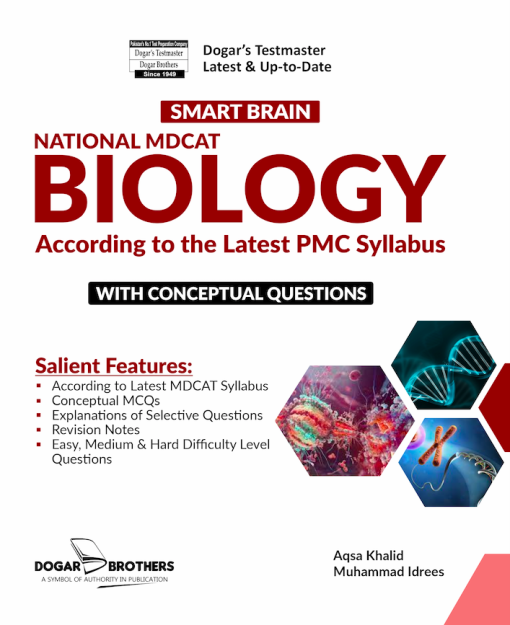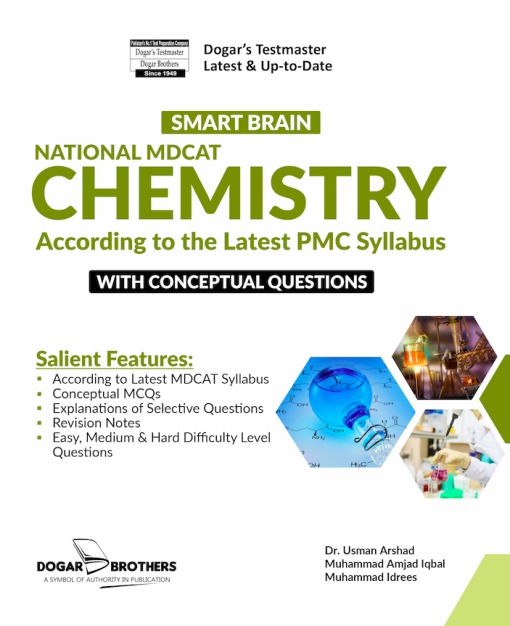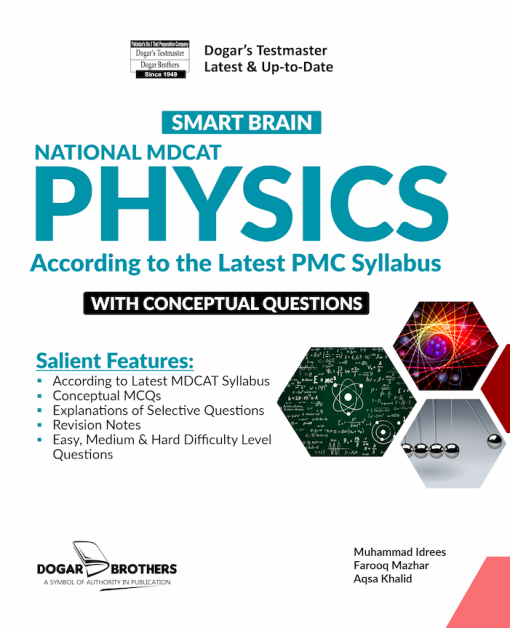MDCAT 2025 Syllabus & Exam Pattern – Complete Guide for Medical & Dental College Aspirants
The MDCAT 2025 exam comes with notable changes in format, weightage, and subject distribution. This comprehensive guide covers the updated MDCAT syllabus 2025, marking scheme, subject-wise topics, difficulty levels, and preparation strategies to help you maximize your score.
MDCAT 2025 Exam Pattern
- Total MCQs: 180
- Duration: 3 hours
- Mode: Paper-based (Multiple Choice Questions)
- Marking Scheme: No negative marking
- Passing Marks:
- Medical Colleges: 55%
- Dental Colleges: 50%
Difficulty Level Breakdown
- Easy: 15% (27 MCQs)
- Moderate: 70% (126 MCQs)
- Difficult: 15% (27 MCQs)
Subject Weightage – MDCAT 2025
- Biology: 45% (81 MCQs)
- Chemistry: 25% (45 MCQs)
- Physics: 20% (36 MCQs)
- English: 5% (9 MCQs)
- Logical Reasoning: 5% (9 MCQs)
Detailed MDCAT 2025 Syllabus
- Biology (45% – 81 MCQs)
Biology holds the highest weightage in MDCAT 2025 with 16 detailed units.
Key areas include:
- Acellular Life: Virus classification, HIV/AIDS symptoms & transmission
- Bioenergetics: Cellular respiration of proteins & fats
- Biological Molecules: Carbs, proteins, lipids, nucleic acids
- Cell Structure & Function: Animal vs plant cells, prokaryotic vs eukaryotic
- Coordination & Control: Nervous system anatomy & reflexes
- Enzymes: Properties, inhibitors, factors affecting activity
- Evolution: Darwin & Lamarck theories
- Reproduction: Human reproductive systems & hormonal control
- Support & Movement: Muscle types, joints, skeletal structure
- Inheritance: Mendelian genetics, linkage, sex-linked traits
- Circulation: Heart anatomy, cardiac cycle, lymphatic system
- Immunity: Specific defense mechanisms
- Respiration: Gas exchange, smoking effects
- Digestion: Digestive system anatomy & gland functions
- Homeostasis: Kidney functions, thermoregulation, excretion
- Biotechnology: Vaccine production, DNA/RNA probes
- Chemistry (25% – 45 MCQs)
Covers 20 units from inorganic and organic chemistry.
Key focus:
- Fundamentals & Atomic Structure
- States of Matter: Gases, liquids, solids
- Chemical Equilibrium & Kinetics
- Thermochemistry & Electrochemistry
- Chemical Bonding: VSEPR, hybridization, molecular shapes
- Periodic Table Trends & Transition Elements
- Organic Chemistry: Hydrocarbons, alkyl halides, alcohols, aldehydes, ketones, carboxylic acids
- Macromolecules: Proteins, enzymes
- Industrial Chemistry: Polymers, dyes, adhesives
- Physics (20% – 36 MCQs)
Physics includes 16 units covering classical & modern concepts:
- Mechanics: Vectors, motion, work, energy, circular motion
- Fluid Dynamics: Bernoulli’s principle, continuity equation
- Waves & Oscillations: Sound, stationary waves, SHM
- Thermodynamics: First law, heat transfer
- Electrostatics & Current Electricity
- Electromagnetism & Electromagnetic Induction
- Alternating Current & EM Spectrum
- Electronics & Modern Physics: Quantum theory, atomic spectra, nuclear physics
- English (5% – 9 MCQs)
Tests reading comprehension, grammar, and vocabulary:
- Reading & Thinking Skills: Contextual meanings, figurative language
- Grammar: Pronoun-antecedent, tenses, prepositions, transitions
- Writing Skills: Proofreading, sentence correction, active/passive voice
- Logical Reasoning (5% – 9 MCQs)
Assesses problem-solving ability in:
- Critical Thinking & Logical Deductions
- Letter/Symbol Series & Patterns
- Cause & Effect Relationships
- Course of Action & Analytical Decisions
MDCAT 2025 Preparation Strategy
Study Time Allocation
- Biology: 45%
- Chemistry: 25%
- Physics: 20%
- English & Logical Reasoning: 10%
Key Tips
- Master Moderate-Level Questions First: They make up 70% of the paper.
- Revise Using the Syllabus: Use it as a checklist for daily progress.
- Integrate Past Papers: Match questions to current syllabus topics.
- Balance Theory & Practice: Apply concepts through MCQs daily.
- Avoid Outdated Material: Always use PMDC official MDCAT 2025 syllabus.
Avoid These Common MDCAT Mistakes
- Using previous-year syllabi without checking updates
- Ignoring low-weightage topics that can yield easy marks
- Over-relying on unofficial summaries instead of the official syllabus
- Studying past papers without verifying topic alignment
Final Words
The MDCAT 2025 syllabus by PMDC ensures a standardized and fair assessment for all candidates. Success comes from syllabus-driven preparation, consistent practice, and strategic time allocation. Treat the syllabus as your roadmap, and you’ll approach exam day with confidence.





